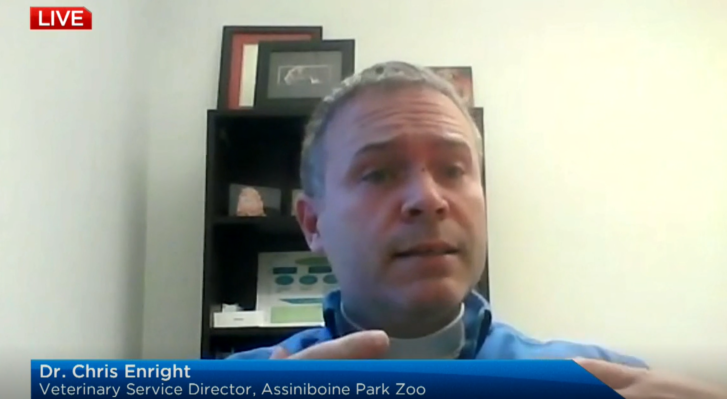Six Canadian zoos are eagerly awaiting a package this holiday season — a shipment of COVID-19 vaccine for their animals.
U.S. pharmaceutical company Zoetis is donating 900 doses of a vaccine that it developed specifically for animals.
According to Dolf DeJong, chief executive of the Toronto Zoo, the vaccines have been produced and are ready to be shipped. The pharmaceutical company is just waiting on some final authorizations.
In the meantime, DeJong says the zoo’s veterinarians are excited to add a new tool in protecting their animals.
“We’re trying to be patient,” DeJong says. “Our team’s been really busy making sure the animals are ready for that injection as soon as it arrives.”
The product from New Jersey-based Zoetis isn’t yet commercially available, but it has been approved for experimental use by the Canadian Centre for Veterinary Biologics of the Canadian Food Inspection Agency.
The company tells Global News that its vaccine is meant to be administered in two doses, three weeks apart. The 900 doses will be enough to protect 450 animals.
The vaccine is already being used south of the border where it has been authorized for experimental use by the U.S. Department of Agriculture.

The Smithsonian’s National Zoo in Washington, D.C., started administering the vaccine last month.
Chief veterinarian Dr. Donald Neiffer says the zoo has targeted about 100 animals for inoculations. So far, about 35 have received two doses, and about the same number have received one. Completing the vaccinations should take until late January.
Neiffer says his staff were very eager to get their hands on the vaccine after an outbreak in September. Several of the zoo’s lions and tigers tested positive for COVID-19.
“We were hoping that after a few days they’d get better, because that’s what they do,” Neiffer says.
“But that’s not was they did. Three animals were severely sick. One we actually talked about euthanizing at one point due to renal failure.”
There have been deaths at some zoos from the coronavirus. Last month, the Lincoln Zoo in Nebraska lost three rare snow leopards. Two infected tigers recovered.
According to the organization that represents Canadian zoos, there have been no outbreaks of COVID-19 at any of its members’ facilities.
“We’re very fortunate so far,” says Jim Facette, executive director of Canada’s Accredited Zoos and Aquariums. “Knock on wood.”
Zoetis says the development of its vaccine started originally for cats and dogs, after reports in February 2020 that a dog was infected in Hong Kong.
“Thankfully, a COVID vaccine for pets is not needed at this time,” the company tells Global News in a statement. “But if that were to change, Zoetis would be able to work quickly to further develop its vaccine for cats or dogs.”
Over the summer, the company donated vaccines to about 70 zoos across the U.S. It says it will continue its donation program and hopes to send about 15,000 doses to approximately 100 zoos and 20 conservatories, sanctuaries and other organizations located in the U.S. and 13 other countries.
Neiffer says COVID-19 has been particularly difficult for large cats such as lions and tigers. There have been reports of deaths in European zoos.
“In the future, if the vaccine’s available, I’m pretty sure my big cats will always be receiving it,” Neiffer says.
“It will be a part of their preventative medicine schedule.”
Article From: Global News
Author: Mike Armstrong

